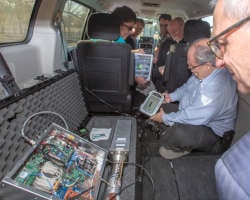 Argon Electronics (UK) Ltd. and the US Lawrence Livermore National Laboratory (LLNL) have secured a two-year, $2.55 million, Cooperative Research and Development Agreement (CRADA) which will facilitate the development of a game-changing, ultra-realistic radiation simulator tool for first responders.
Argon Electronics (UK) Ltd. and the US Lawrence Livermore National Laboratory (LLNL) have secured a two-year, $2.55 million, Cooperative Research and Development Agreement (CRADA) which will facilitate the development of a game-changing, ultra-realistic radiation simulator tool for first responders.
The project, which has been funded by a Department of Energy Technology Commercialization Fund (TCF) grant, will combine LLNL's innovative Radiation Field Training Simulator (RaFTS) technology with Argon's widely respected track record in the creation of simulation software and hardware.
RaFTS provides a superior first responder training solution that can be used both to protect against acts of radiological or nuclear terrorism and to deal with their subsequent aftermath.
In contrast to other existing simulator training methods, RaFTS technology produces a response within an actual radiation detector that exactly replicates all the physics of real-world usage.
The RaFTS hardware has been designed as an externally mounted device that interfaces directly with the circuitry of operational radiation detection systems.
The outputs are of sufficient quality to ensure that detection instruments behave exactly as they will against actual radioactivity, and the data that is collected offers a sufficient degree of realism to enable the identification, measurement and location of a radioactive source.
Commenting on the project, Argon's CEO Steven Pike said: "We are delighted to have formalized our relationship with LLNL to develop, integrate and commercialize their RaFTS technology.
"Working in cooperation with LLNL and leading detector manufacturers, this project will provide spectroscopic instrument users with an unprecedented and life-like exercise capability to ensure responder training is maintained at the highest level."
LLNL nuclear chemist, Steve Kreek, explained: "If the RaFTS and Argon collaboration goes as envisioned, we will create a whole new ecosystem of training peripherals which will substantially raise the bar on emergency response preparedness.
"It is exciting to see something that we have been working on for more than a decade move into the licensing and commercialisation phase," he said.
LLNL's business development executive, Annemarie Meike, has described the development of RaFTS as a "gamechanger" for first responders.
"This technology enables them to take a giant leap in the sophistication of the scenarios that they can pursue, and just as importantly, the attention to needs such as enhanced exercises.
"The goals of the TCF program are perfect for the commercialization stage and aims that the partners want to achieve," she added.
The RaFTS CRADA funding comprises $750,00 that comes to LLNL from the TCF grant, together with an estimated $1.8 million that will be provided through in-kind contributions from the company.
RaFTS was one of six LLNL projects that were successful in gaining funding during the latest round of grants announced in July 2019.
The project's principal investigator is Lab computer scientist, Greg White.






